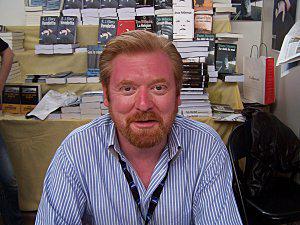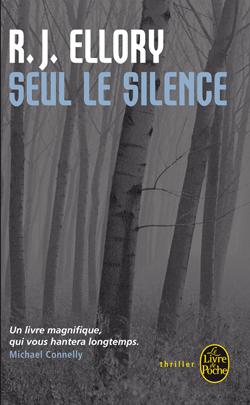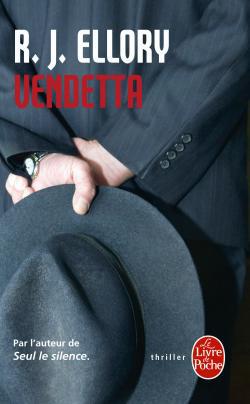Ce billet est en Anglais, car je sais que certains d'entre vous le lisent couramment et préféront la VO. Une version française est juste au dessus ! ou LA

C'était au Festival des Etonnants Voyageurs de St Malo au printemps derniers. R.J Ellory présentait, lors d'une conférence
passionnante, son dernier roman paru en France : Vendetta. Alors, il y a eu une séance de dédicace : pour cela j'avais acheté la version poche de Seul le silence, autre roman de l'auteur, roman
que de très nombreux billets élogieux m'avaient bien donné envie de lire. 
J'en étais à... Dédicace et obtention de l'adresse mail.
Seul le Silence, je l'ai lu, dévoré, adoré et chroniqué en août. Et la semaine dernière, lorsque j'ai sollicité par mail une interview auprès de cet auteur britanique de best seller, c'est cinq minutes après que j'ai reçu un "Oui" enthousiaste ! L'auteur s'excusait juste d'avance de ne pouvoir répondre qu'en Anglais !
Voici donc cet interview !
Oh my God, I've just read your bio on your website. I am so impressed ! Are you sure you've got enough time to answer me?
RJ.E : Yes!
In France, we know you for two of your novels " A quiet belief in Angels" (Seul le silence) and "A Quiet Vendetta" (Vendetta). But there are so many other books ! When will they all come out in France ? Why such a long time between the English coming out and the French one. By the way, must be funny to come in St. Malo to speak about a book you wrote more than five years ago. Didn't want you to say "hey, you know, I wrote many things else !" ?
RJ.E : Well, there are currently eight books available in English – Candlemoth (2003), Ghostheart (2004), A Quiet Vendetta (2005), City of Lies (2006), A Quiet Belief In Angels (2007), A Simple Act of Violence (2008), The Anniversary Man (2009) and Saints of New York (2010).Three are now available in French – A Quiet Belief In Angels (published as ‘Seul le Silence’, A Quiet Vendetta (published as ‘Vendetta’), and now A Simple Act of Violence (published as ‘Les Anonymes’)I only secured a French publisher two years ago, so obviously there is a backlog of titles.I am committed to my French publisher, and we have agreed to publish all the titles.We are doing them in a slightly different order, and this is fine as none of the books are connected to one another.Sometimes it is odd to talk about a book I wrote many years ago, and I really should take the time to re-read them as many of the details of the story are forgotten with time, but it is always interesting to look back and see how I was writing five years ago.It has been said that if you read something you wrote years before and you cringe a little, and you immediately think how you could have done it better, well that means you are improving as a writer !When I read old material I can see where I have taken too long to say something, or how I could have made it simpler.I think over the years of working I have learned how to say more with less words !
In "Seul le silence/ a quiet belief in angels", the reader attends an author’s birth, little by little. For me, it was very fascinating and emotional. The way Joseph begins to write... is it autobiographical ? Is there a huge part of you in Joseph's character?
RJ.E : I think this is a question authors are always asked.How much of their work is autobiographical ?
There is that perennial question: How much of an author’s work is autobiographical ?I think we absorb so much from life – some of it good, some of it bad.We take in events and circumstances, we deal with them (or not), we recover, we carry on, we try our best with everything we do.Sometimes we get it right, other times we get it wrong.That is life, and that is living.As with any field of the arts – whether it be painting, sculpture, choreography, musical composition – the creator must draw on personal experience and personal perception in everything he or she creates.I think that what we paint and what we write and what we sing are merely extensions of ourselves, and that extension grows from personal experience.I think there are very few writers who write their own lives into novels, but I think there are a great deal who write their perceptions and conclusions and feelings about their own lives and the lives of others into the characters they create.
Can you tell them what does an Ellory's day look like? What are the good writing conditions for you: your bedroom, your kitchen ? With music? With coffee? A cup of tea? Alone far from everyone ? With your good old jacket or a simple T.shirt ? Barefoot, or with your slippers? With paper and pen or PC? With a cigarette to keep concentrated or just you and the silence? (seul le silence !!!)
RJ.E : For years I wrote longhand, almost three million words, but now I use a computer. Sometimes when I'm away from home I'll write longhand, and then transcribe when I return.I tend to write a whole book, furiously ploughing through it, and then I go back through from start to finish and handle all the snags, anomalies, mistakes, cut back on the over-writing as best I can.It’s kind of organic in a way, like it’s something that takes on certain character aspects of its own.It’s like living with a bunch of people for a few weeks, and you watch them grow, watch them take control of certain elements of the story, and then when you’re done it’s like losing something. Capote once said that finishing a story was like taking a child out into the yard and shooting them.Perhaps a little melodramatic, but I know what he means!When a book is finished it kind of leaves a hole in you, and then you have to start another one right away!I am disciplined.I start early in the day.I try and produce three or four thousand words a day, and work on the basis of getting a first draft done in about twelve weeks. Sometimes it takes longer, sometimes shorter.For me a book always begins with the emotion I want to evoke in the reader.That’s the most important thing for me.How does a book make you feel, and does that memory stay with you?So that’s my first consideration: the emotional effect I am trying to create.The second thing is the location.Location is vital for me as the location informs and influences the language, the dialect, the characters – everything.I choose to start a book in Louisiana or New York or Washington simply because that ‘canvas’ is the best for to paint the particular picture I want to paint.I buy a new notebook, a good quality one, because I know I’m going to be carrying it around for two or three months, and in the notebook I will write down ideas I have as I go.Little bits of dialogue, things like that. Sometimes I have a title, sometimes not.I used to feel very strongly about having a good title before I started, but now – because at least half the books I’ve published have ended up with a different title - I am not so obsessive about it !And as far as little idiosyncratic routines and superstitions are concerned, I don’t know that I actually have any that relate to starting a book.I do have a routine when I finish a book.I make a really good Manhattan, and then I take my family out to dinner !
All your books take place in the United States. Is the British weather so bad that you don't write a single story in the deep south of great Britain, like Brighton, with Mrs. Marple for example? Stop joking: Why the US? And one day, might you write a book taking place in Australia or in France, like in St Malo, for example? (If you need a private guide tour, I'm yours !)
RJ.E So…America, America, America…
Paul Auster said something very interesting one time. He said that said that becoming a writer was not a ‘career decision’ like becoming a doctor or a policeman. You don’t choose it so much as get chosen, and once you accepted the fact that you were not fit for anything else, you had to be prepared to walk a long, hard road for the rest of your days. I also believe that you don’t so much choose your genre or subject mater, it kind of chooses you. I thin the very worst kind of book you could write is the book that you think others will enjoy. I thin the best kind of book to write is the one you believe you yourself would enjoy reading. I think the genre you write in has to relate to your own interests and passions. Writing a book can take a while, and if you’re not interested in what you’re writing about, then that’s going to make the job so much harder, perhaps even impossible.
I think I was weaned out of infancy on American culture. I grew up watching Starsky and Hutch, Hawaii Five-O, Kojak, all those kinds of things. I loved the atmosphere, the diversity of culture. The politics fascinated me. America is a new country compared to England, and it just seems to me that there was so much colour and life inherent in its society. I have visited a number of times, and I honestly feel like I’m going home. And I believe that as a non-American there are many things about American culture that I can look at as a spectator. The difficulty with writing about an area that you are very familiar with is that you tend to stop noticing things. You take things for granted. The odd or interesting things about the people and the area cease to be odd and interesting. As an outsider you never lose that viewpoint of seeing things for the first time, and for me that is very important. Also many writers are told to write about the things they are familiar with. I don’t think this is wrong, but I think it is very limiting. I believe you should also write about the things that fascinate you. I think in that way you have a chance to let your passion and enthusiasm for the subject come through in your prose. I also believe that you should challenge yourself with each new book. Take on different and varied subjects. Do not allow yourself to fall into the trap of writing things to a formula. Someone once said to me that there were two types of novels. There were those that you read simply because some mystery was created and you had to find out what happened. The second kind of novel was one where you read the book simply for the language itself, the way the author used words, the atmosphere and description. The truly great books are the ones that accomplish both. I think any author wants to write great novels. I don’t think anyone – in their heart of hearts – writes because it’s a sensible choice of profession, or for financial gain. I just love to write, and though the subject matter that I want to write about takes me to the States, it is nevertheless more important to me to write something that can move someone emotionally, perhaps change a view about life, and at the same time to try and write it as beautifully as I can. I also want to write about subjects – whether they be political conspiracies, serial killings, race relations, political assassinations or FBI and CIA investigations – that could only work in the USA. The kind of novels I want to write just wouldn’t work in small, green, leafy villages where you find Hobbits!
With me, the most important thing about any novel is the emotion it evokes. The reason for writing about the subjects I do is simply that such subjects give me the greatest opportunity to write about real people and how they deal with real situations. There is nothing in life more interesting than people, and one of the most interesting aspects of people is their ability to overcome difficulty and survive. I think I write ‘human dramas’, and in those dramas I feel I have sufficient canvas to paint the whole spectrum of human emotions, and this is what captures my attention. I once heard that non-fiction possesses, as its primary purpose, the conveying of information, whereas fiction possessed the primary purpose of evoking an emotion in the reader. I love writers that make me feel something – an emotion, whatever it might be – but I want to feel something as I read the book. There are millions of great books out there, all of them written very well, but they are mechanical in their plotting and style. Three weeks after reading them you might not recall anything about them. The books that really get me are the ones I remember months later. I might not recall the names of the characters or the intricacies of the plot, but I remember how it made me feel. For me, that’s all important. The emotional connection. So back to the setting and literary style. ‘A Quiet Belief In Angels’, for example, has been described as ‘Steinbeck-esque’. The setting and the literary style were certainly not meant to be evocative of Steinbeck. I have to be completely honest and tell you that prior to writing ‘A Quiet Belief In Angels’ I had read only ‘Cannery Row’. I have cited Steinbeck as an inspiration, also Hemingway, Carson McCullers, Harper Lee, Willa Cather, but it is only now that I am beginning to read more of their work. As with all my novels the style in which I write is based on the subject matter. Other novels – ‘A Quiet Vendetta’, ‘City of Lies’, ‘The Anniversary Man’ – are actually written in a far more economical and punchy style. The style came with the setting, the style came with the voice, and there was never any intention to write like another author.
I have done, and still do, a tremendous amount of research. It was always very, very important to me to ensure that everything mentioned in the book was genuine and correct as far as the time and place were concerned. It can be quite a task. There is an old adage as far as writing is concerned – ‘Wear your learning lightly’ – meaning that you cannot bury your fictional work beneath a ton of facts. I had to be careful of that too; to make sure that the history and the cultural aspects necessary to give a sincere reflection of the time and place weren’t so overwhelming that the story beneath was lost. Some facts were hard to find, others somewhat easier, but still the responsibility lies with the author to make his or her work as sincere and genuine as possible. You can read about places – about cities and towns and areas. You can study guide books, maps, photos on the internet, but any description of a place is the author’s ‘take’ on that place. Readers are not necessarily looking for anything that will agree with their perspective on a location; they are looking for something that evokes an atmosphere. The first sentence of ‘A Quiet Vendetta’ is eighty-seven words long and has no full stop at the end. It’s about New Orleans. I had not been to New Orleans when I wrote it, and I still haven’t. People from New Orleans write to me. They don’t say ‘Hey, you haven’t been to New Orleans…you can’t write this!’ They say, ‘That’s what New Orleans feels like to me as well!’ It’s about evoking an atmosphere, not agreeing with everyone else’s viewpoint of a place. Does that make sense?
Anyway, more than anything else is people. Readers will forgive you anything if you engage them, and the way to engage readers is with your characters.
The thing that fascinates me is people. Doesn’t matter who they are or what they do, the important thing is people. The thing that never ceases to amaze me is the indomitability of the human spirit, the things that people are capable of overcoming, and the fact that they can then survive beyond that. For me, writing ‘crime thrillers’ or ‘mysteries’ is not so much about the crime itself, even the investigation, but the way in which such events can be used to highlight and illuminate the way that people deal with things that are not usual. If there is one common thread throughout my books, though they are all very different stories, it is that we are always dealing with an ordinary person thrown into an extraordinary situation. That’s the common theme. That’s the thing that fascinates me. I suppose I am a romantic at heart, and I try very hard to be in touch with the emotional nature of people and things, and what I am always striving to do is have a reader feel what the characters are feeling, to get an idea that they have spent some time with real people, and to bring about the sense that they were aware of what was going on with that character on many levels. That, for me, seems key to making a book memorable.
If I want to become an as excellent writer as you are, what should I do?
RJ.E : What drew me to write? I loved reading.That was the simplicity of it.I just loved reading.Always had the thought there that it would be great to write something capable of moving someone emotionally, to create that kind of effect, to have someone read something you’d written and be moved by it. That was the thing: to feel like you had something worth saying.And so I just went ahead and did it ! I didn’t go to college or take any classes or anything like that.Even at school I was spectacularly bad at grammar and composition, such things as that.I think I just really wanted to say something, and I kept on working at it until I felt I had accomplished a style that pleased me.I just wrote and wrote and wrote, and I carried on reading as much as I could (though never the two at the same time as I find that reading other peoples’ books while you’re writing a book tends to interfere with your thought processes!)
It took you many years and many stamps to attend to be published. Once, you even quit writing. And now, look where you are ! Isn't frightened ? Don't feel some kind of dizziness ? And aren't you tired of all theses nominations and awards you received ?!!!
RJ.E : For me it was always about the writing.In the summer of last year I secured another publishing contract, but it was not without a couple of weeks of nervousness about whether or not I was selling sufficient books to actually warrant being granted another contract.The worst thing for me would have been to have known what it was like to be writing for publication, and then because of low sales be in a situation where I then could not get published.Luckily my publishing company are very definitely of the viewpoint that they believe in and support what I am doing, and I am immensely grateful for all the tremendous support and encouragement they have given me over the last few years.I do have confidence in the fact that I can see a career ahead of me.So, in simple terms, being published has made it possible for me to continue doing what I love. However, I never take it for granted.I know that I am privileged to have been published, and I continue to work as hard as I can to tour and travel as much as possible, to do as many interviews as I can,. To try and make as many new readers as possible.I will never rest on my laurels!
When you start a new book, do you know from the first page where you’re going until the end and does it come in your head step by step, or page by page, or chapter by chapter... Anyway, how do you build a novel and catch readers like this?
RJ.E : I do not plan a novel. I do not have a synopsis or a clear outline.I just have a rough idea of the sort of novel I wish to write, and then I get going.I change my mind as I work.I make new decisions about characters, about the ending, about all sorts of things.I just keep trying to write the best novel I can.
What's the best compliment someone could make, and the worst insult someone could make, both to you as a writer and as a man ?
RJ.E : As a writer, I think the worst compliment is that someone says they tried to read your book, and they didn’t finish it because they just didn’t care at all about what you had written!
As man, well that’s a hell of a question!Maybe the worst thing that someone could say to you as a man is the same as the worst thing they could say to you as a human being: That you just don’t matter.
I think the best compliment is the opposite: That you do matter, that you are important, that you are necessary.
What are the 3 last books you read and loved ?
RJ.E : The last three books I read and liked very much
were:
'Norwood' by Charles Portis
'Winter's Bone' by Daniel Woodrell
'Provinces of Night' by William Gay
Have you already written the book you dreamed of or do you still have to write this famous book?
RJ.E : No, I still have to write this book...and if I ever succeed in writing this book, then I will probably stop writing!

Vendetta sort ce mercredi 6 octobre en format poche ! Plus aucune raison de ne pas le lire n'est-ce pas !


